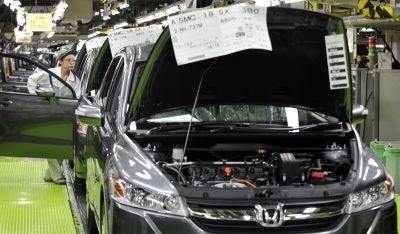Japanese brands Honda and Toyota increased the discounting of their vehicles last month, according to the monthly analysis by US auto publication Edmunds.com.
A month after the pair slashed US "incentive spending" (discounts) in the wake of the Japanese earthquake and production shortages, both seem to be spending more in a bid to keep customers loyal - even if the cars aren't on the lots.
Edmunds.com said June 30 that Toyota increased its incentive spend by a whopping 30.5 percent in June, while Honda's rose by four percent, introducing a "Honda Promise" program which allows consumers to seal a deal on a new vehicle, even if it can't be delivered for some time.
"By kicking up their incentive spending, Toyota and Honda are sending a clear message that production levels are starting to return, even if those vehicles haven't yet hit dealer lots," said Edmund.com's Jessica Caldwell in a statement.
However, while there was good news from Japanese automakers, overall spending by automakers on discounts remained low - down nearly 20 percent compared to June 2010 at $2,165 per vehicle.
Amercian automakers spent the most, discounting $2,799 per vehicle on average, while European automakers offered $1,961 per vehicle and Japanese automakers shelled out $1,510 to consumers.
The only country's automakers which saw a decrease in the amount being spent to lure consumers in were Korean, with manufacturers cutting deals by 8.5 percent to $1,212 per vehicle.

Join our commenting forum
Join thought-provoking conversations, follow other Independent readers and see their replies
Comments